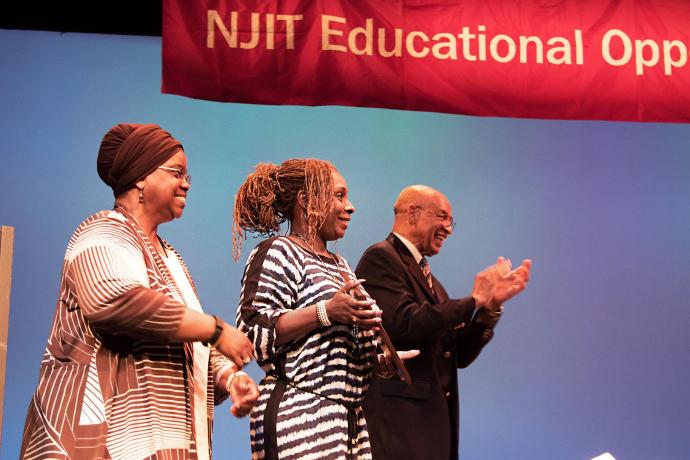End of an Era at the Educational Opportunity Program

Tony Howell’s office on the third floor of NJIT’s Campbell Hall is as much a retrospective of the past two decades of the Educational Opportunity Program (EOP), of which he has been executive director since 1997, as it is a testament to the devotion of the man himself. Pictures of EOP students, many with Howell by their side, adorn the walls, and trinkets from the program line the window shelf along the back of the room.
Dressed this day in a black button-down shirt with “NJIT Educational Opportunity Program” stitched in red, Howell is as always a staunch representative of the program — which provides academic support and career and personal counseling to underserved first-time full-time freshmen and transfer students, with the end goal of improving their educational and professional outcomes. Toward this end, EOP offers an intensive Pre-freshmen Summer Academic Enrichment Program, a Winter Intersession, Undergraduate Research Experience opportunities, and access to internships and jobs.
But both Howell and the program, through which he has helped shepherd roughly 2,500 students, will be closing a long chapter over the next six months as he steps away from the helm. “I’m moving myself out of the day-to-day operations of running the EOP program,” said Howell, explaining that during this transition period he will help the university launch two important initiatives and then continue as a consultant to NJIT and EOP.
One of those initiatives involves assisting NJIT in applying for and launching its membership in the Garden State Alliance for Minority Participation (AMP), a National Science Foundation grant program that funds schools in defined geographic areas to recruit and retain minority students, and ultimately increase the number of minorities in STEM fields. (NJIT has been part of the Philadelphia AMP for the past 21 years and seeks to transfer to the New Jersey organization.) Howell will also lend his expertise to recruitment of minority faculty and has already begun introductions.
“I’ve got a lot of contacts over 30, 40 years of being in higher education,” he noted. “I know a lot of people who are doing a lot of things.”
Before he moves on from the university, we chatted with NJIT’s “resident hugger” about the evolution of EOP students over the years, the sense of family that is integral to the NJIT program, his legacy of helping thousands of kids complete college and more.
ON MAKING EOP EXCLUSIVE
As a former Green Beret, Howell gained valuable experience in how to “change the whole atmosphere of an area” by helping people and shifting their mindset. Among his first acts as EOP’s executive director was bringing a greater sense of worth and exclusivity to the program, through EOP clothing, professional development and other faculty and student perks. He says it took about three years to realize the positive impact, and that today “we really do make a group here. [We’re] really tight.”
ON WELCOMING DIFFERENT GENERATIONS OF STUDENTS
“Twenty years ago, kids were coming into the program because they couldn’t get into the university, but they had a tremendous amount of drive to do whatever’s necessary to be successful. Fifteen years ago, the kids…could possibly be members of the university through regular admit and maybe even the Honors College… Ten years ago, SAT scores got to be pretty good. We were within 100 points of the university’s regular admit… [Today] the kids are smarter, but…they spend more time with their thumbs and their fingers and their heads down [looking at their phones] than they do in talking with each other. So our educational process, our summer program and our academic-year program have changed from ‘Let’s get you up to speed’ to ‘Let’s get you to be more sociable and let’s get you more interactive with other people.”

ON CHANGING EOP WITH THE TIMES
“If you’re really running a good student services program, you look at your clients… You’re constantly doing adjustments, sometimes it’s minute, sometimes it’s major.” For example, EOP under Howell’s leadership implemented the Winter Intersession to help prepare students for their next semester of classes before the program went universitywide. Now EOP is developing a senior seminar on life skills (“Kids have a job, but may not know how to pay bills.”), and designing a session about geographic diversity — the latter aimed at students who are bound for jobs and careers in a radically different environment than what they are used to, from big cities to rural towns for instance.
ON REMAINING FOCUSED ON EOP’S SENSE OF FAMILY
“I’ve been at maybe 20 weddings so far. At some of them I’ve been asked to be the representative father. At some of them I’ve been asked to be the person who spoke… I can say that at other programs there’s a kind of a sense of family, but ours is very strong and we intentionally do it that way. We really do. We want them to depend on each other more than anything else… I’ve got a lot of sons. I have one biological son, but I’ve got a lot of sons.”
ON LEAVING A LEGACY
Howell’s innate calling for facilitating students’ journeys through higher education took him to Indiana State University, Indiana University, University of Texas and Howard University before NJIT, where he spent his first four years as executive director of consortium programs at The Center for Pre-College Programs. He figures that over the course of his career he has helped close to 11,000 students get into and graduate from college. “It’s scary to me…scary positive.”
